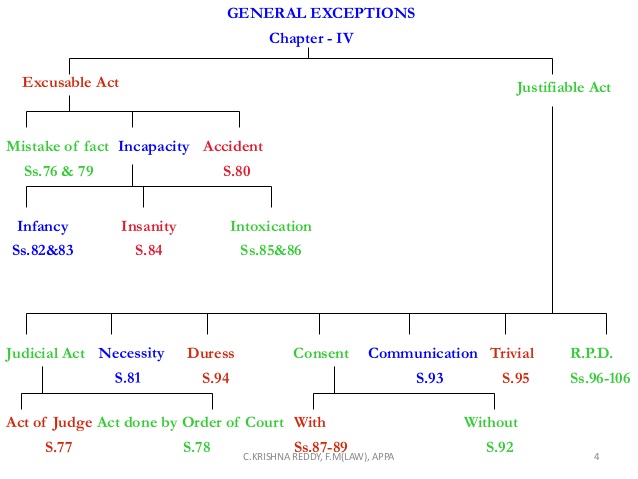GENERAL EXCEPTIONS: PART 1 - INTRODUCTION
It is presumed that the offender who has committed murder should be held liable. But if A pushes B, who was coming to kill A by his dagger, and he fell down the building and dies. Do you think A should be held liable for such an act? For such actions which are though offences but should be excluded from criminal liability, general Exceptions bring justice in such cases that are enacted under IPC.
S. 6 of IPC states that,
“Throughout
this Code every definition of an offence, every penal provision, and every
illustration of every such definition or penal provision, shall be understood
subject to the exceptions contained in the Chapter entitled “General Exceptions”,
though those exceptions are not repeated in such definition, penal provision,
or illustration.”
IPC
stipulates liability to persons who commit any offence. But the liability is
subject to the exceptions mentioned under chapter IV of the code. Any offender would be liable for
punishment unless it is proved that the act comes under chapter IV. Section 6 of the IPC is the legal provision that ensures
that every offence listed under IPC should be understood with certain
exceptions as listed under chapter IV.
Why a specific chapter was created for defining these general exceptions?
The general
exceptions given under IPC are of universal application and to decrease the
repetition of such exceptions by defining them within every section, the
drafters created a different chapter for the same and titled it as General
Exceptions.
These
exceptions are classified under two broad categories:
1.
Excusable
2.
Justifiable
Excusable exceptions
This category of exceptions excuses certain people from being held
liable. Law exempts the acts of infants, insane or intoxicated persona, and
also the act committed under a mistake of fact, from liabilities even if the
act constitutes to be an offence. Excusable offences are listed under IPC due
to the absence of the necessary element of mens rea during the commission
of an offence. These exceptions are created since mens rea is important
to constitute a crime, and if mens rea is absent no crime can be
constituted. Here the focus is on the actor of the offence and it’s the
characteristics of the person that defines whether the offence committed
would come under the general exception or not.
For example, any offence committed by an infant, would not call for
liability. Such acts come under excusable exceptions.
Excusable exceptions are covered under sections 76, 79, 80, 82-86 of IPC.
Justifiable Exceptions
These exceptions exempt cases
in certain circumstances including:
- where offence committed was done either by a judge; or
- while acting judicially; or
- due to an order of the court; or
- to prevent harm to any person or property;
- with or without consent of the person for whose benefit the act is done; or
- when communication is made in good faith; or
- when a person is compelled by a threat to do an offence; or
- the act is of a trivial nature; or
- the act is done in the exercise of the right of private defence.
These exceptions are based on the circumstances in which action was
committed by the offender. Here, in the case, despite mens rea the
offender can be exempted from liability and can be justified by a proper
explanation as listed under these exceptions.
These exceptions are listed under Sections 77, 78, 81,
89-90,92-106.
Burden of Proof
An act prohibited under IPC shall be constituted as an offence or
crime unless it is proved by the defendant or the accused that the offence
comes under the ambit of general exceptions. Until such proof, the court shall
presume the absence of such exceptional circumstance at the time of the
commission of the offence. The ‘Onus’ lies on the accused to prove the presence
of such exception. Eventually, it depends on the court of justice whether the
evidence was satisfactory enough to consider general exceptions in those cases.
The sections covered under general exceptions shall be dealt with
under the next part II and III.
By,
LawVastutah
References
- PSA Pillai, Criminal Law, 14th ed.
- Ratanlal & Dhirajlal, Indian Penal Code (PB), 36th ed.
- KD Gaur, Criminal Law-Cases and Materials, 9th ed.
- Pearl Chinir, General Exceptions under the IPC, 20th November 2018, https://blog.ipleaders.in/general-exception-under-ipc/ (Last Visited on 2 October 2020).
- Indian Penal Code, 1860.




Comments
Post a Comment